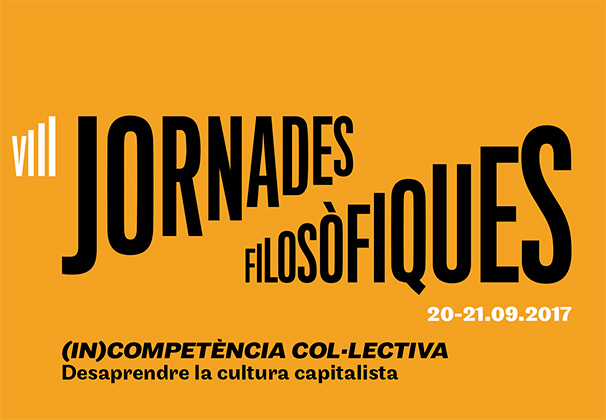What are you looking for?
You might be looking for...
VIII Philosophical Seminars
COLLECTIVE (UN)COMPETENCE. Unlearning capitalist culture
Free entry
Limited places
Activities with simultaneous interpretation service

The eighth and latest Philosophical Seminars intend to focus their attention on those contemporary social practices which can help us think specifically about resistance to the competence-competition dynamic. It is a question, therefore, of attempting to point out the registers in our lives and social spaces that continue to drive a logic of exchange and of the common good that is incompatible with this fundamental mechanism of capitalist subjectivation.
One half of the competence-competition dynamic is, in fact, fundamental to prevailing liberal logic (competitiveness), while the other refers to a required epistemological condition produced by the combination of procedures that structure the function of globalised knowledge institutions (to have competence or not). The convergence of the scientific and economic concepts translates into a complex system of formulation and computation regarding the products created within these institutions. This objectification is the specific form that the application of private property logic in the field of knowledge takes. Therefore, it is the specific historical form that today the inter-penetration of knowledge and capitalism takes. The situation that defines this pairing can be extrapolated to our productive system as a whole: The attempt to construct criteria of recognition and forms of exchange that can be applied universally has become the way in which the logic of trade and private property is deployed on a global scale.
Competitiveness is the logic and dynamic that mobilises and forms everything in our lives that we allocate, whether we like it or not, willingly or unwillingly, to our constitution of competent-competitive agents of the capitalist production system. It is not an original thesis; it is a sad fact of our reality.
At the heart of all of this lies the paradox that the crux of our political system is governed by a different kind of logic. Democracy, as some contemporary philosophers have repeatedly stated, consists precisely in placing in a position of command a subject that is necessarily incompetent in the matter, according to the scientific and economic competitiveness criteria: The indiscriminate citizen called upon to decide and to substantiate the legitimacy of political power. In terms of democracy, political competence-competition is general and, therefore, it continues to be a social lever with which we can combat our own capitalist degradation.
Furthermore, a friendly conversation, for example, seems to still carry as a requirement the implementation of some way of sharing intelligence that is incompatible with the protocols of computation and privatisation of thought that are inherent to the function of the globalised knowledge institution.
Mapping attitudes, practices and areas that remain heterogeneous in the logic of competence-competition and private property could be a specific way of contributing to unlearning capitalist culture.
PROGRAMME
ARTS SANTA MÒNICA / 20.09.2017
17h – 17:15h
Opening of the VIII Philosophical Seminars
Felip Martí Jufresa and Xavier Bassas
17:15h – 18:15h
Conferences
Olivier Quintyn: «Dismissing/re-instating competence-competition and performances: Art as a laboratory of forms of social criticism»
Jorge Luis Marzo: «Aesthetics of deartification»
18:15h – 19:30h
Performance
Martine Pisani, Theo Kooijman and Eduard Mont de Palol
19:45h – 21h
Collective action
Olga Sezneva, Hannah Schwadron and Susan Ossman (Moving Matters Traveling Workshop)
INSTITUT FRANÇAIS DE BARCELONA / 21.09.2017 (C. de Moià, 8)
19h – 21h
Conference
Alain Jugnon: «For a literary communism without state, philosophism or capitalism»
21h
Close of the VIII Philosophical Seminars

Organisation
Arts Santa Mònica and Institut français de Barcelona
Collaboration
University of California Riverside and Universiteit van Amsterdam